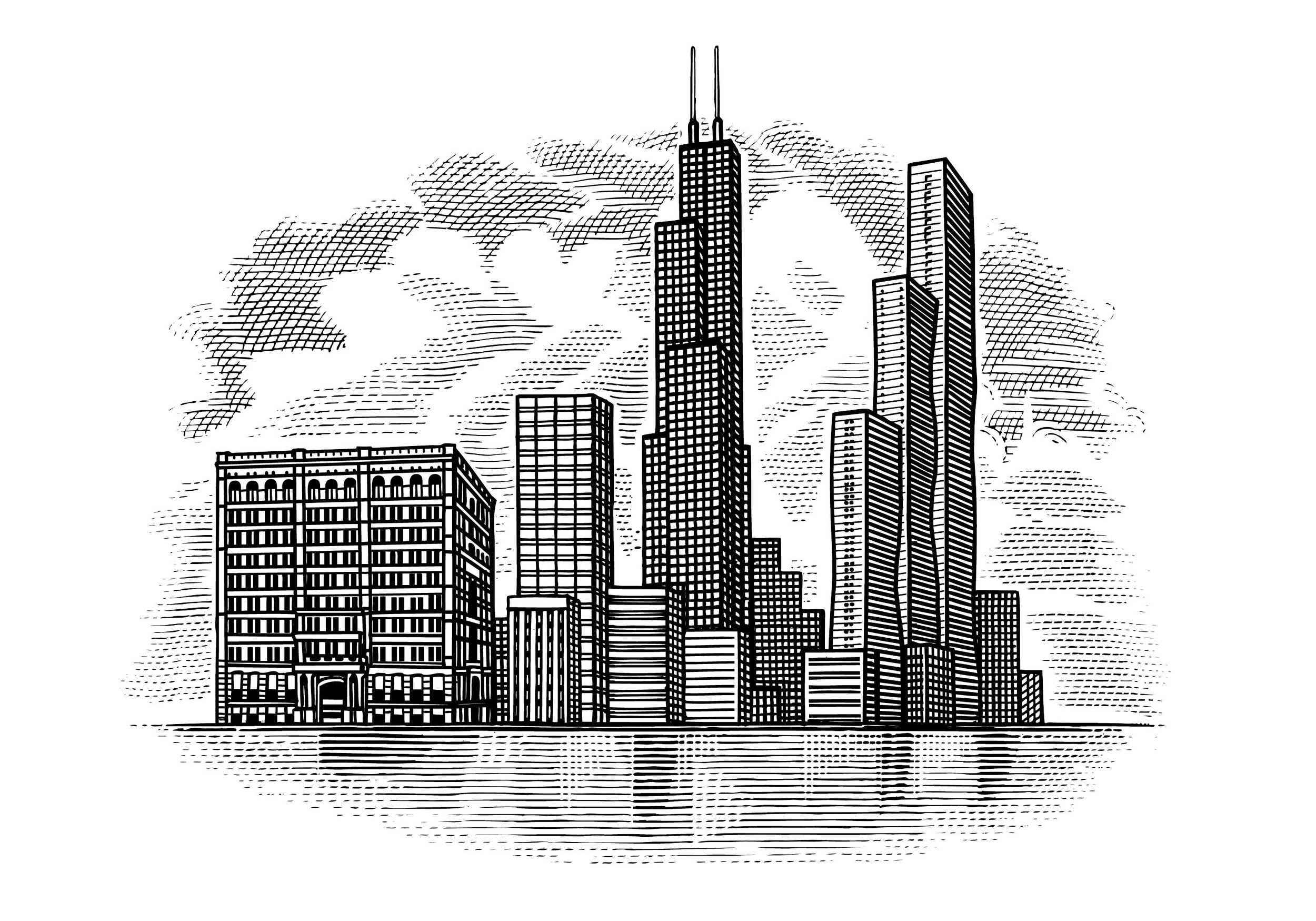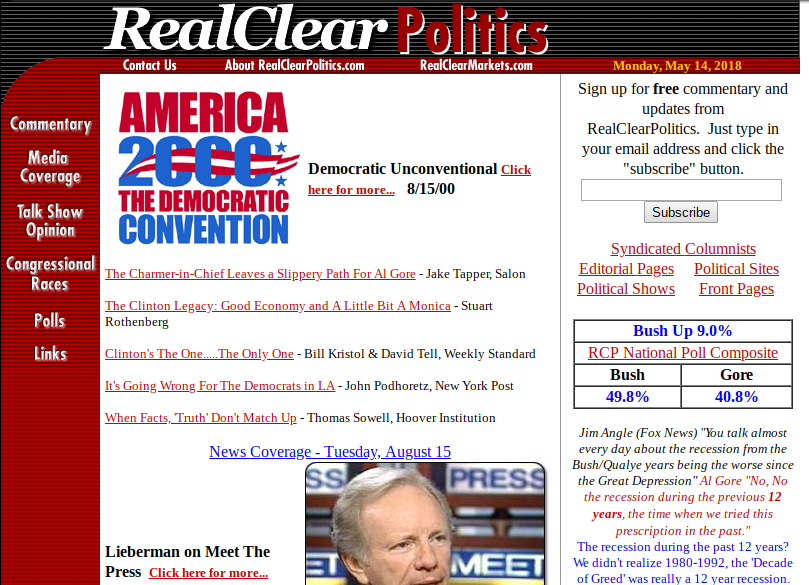The Monthly Memo — May Edition
The Interview Series: Tom Bevan
If you are big into politics, the odds are you've heard of RealClearPolitics. Around election years they come up in the news about their polling aggregation method, which usually turns out to be a more accurate predictor of an election's outcome than any one poll would be individually. But RealClear is also well known for it's homepage (seen above in its first iteration), which collections news and opinion from a variety of sources, regardless of partisan bent.
What a lot of people don't realize about RealClearPolitics is that it was started in Chicago by Chicagoans, which is no small feat considering that Chicago is a thousand miles away from the centers of power in New York and Washington. Tom Bevan, co-founder of RCP, still lives here and helps direct the site from the Midwest. In this interview I asked him how Chicago influences the direction of RCP, challenges facing media companies today, and what advice he has for aspiring journalists.
Tell me a little about your background. How did you find your way to Chicago, and what keeps you attracted to the city?
I found my way to Chicago by accident. I moved back to Seattle after graduating from Princeton, unsure of what I wanted to do. After a couple of months I decided that I would head back to the East Coast. My college roommate, James Lowry, was a New Trier grad and had moved back to Chicago after graduation. I was driving through town, planning to crash on his couch for the weekend, and never left.
RealClearPolitics was launched in 2000 when the commercial Internet was still in its infancy. Where did the interest in politics come from originally, and what drove you to create RealClearPolitics 18 years ago?
I was basically apolitical through college, and got bit by the bug after graduation. The Co-Founder of RCP, John McIntyre, had been a political junkie for years, and when he arrived in Chicago in 1993 to trade at the CBOE [Chicago Board Options Exchange], we had this shared passion for politics and elections. As you point out, the internet was still in its infancy, but by the late 1990s we realized you could read online what was being written in the Los Angeles Times and New York Times on the same day. That was our "aha" moment, which spurred the idea of a site that would gather up all the best news, commentary and analysis of politics and elections for junkies like us.
Read more at The Monthly Memo.
Chicago Needs The Chicagoan
May has been a pretty busy month for content on the website. I had a piece up a few weeks ago arguing for the return of The Chicagoan Magazine, essentially our answer to The New Yorker. It is clear to me that there is a market for a cultural magazine in Chicago, and that Chicago Magazine doesn't quite cut it (it is more of a lifestyle publication than anything else). And in fact, there have been two attempted revivals of The Chicagoan Magazine -- both of which have ultimately failed. I explore this in more depth in the article.
The new Chicagoan Magazine should take a page from the New Yorker’s playbook and be a weekly publication. Chicago as a city is certainly big enough to handle that kind of production schedule, and as a region Chicagoland and the greater Midwest has more than enough talent to staff a weekly magazine. The challenge, perhaps, is finding the money to pay that talent.
But if that can be overcome, if the funding gap can be closed, The Chicagoan can be to the Midwest what The New Yorker is to essentially everything else: a showcase of Midwest and American culture through a distinctly Chicago lens. It should be a resource valuable to everyone who picks it up and it should add knowledge to the body politic of life between the coasts.
Chicago needs The Chicagoan. The question now is, who is bold enough to get it started?
Read more at The Monthly Memo.
Around the Web
How Chicago Beat New York for the 1893 World's Fair from the Chicago Tribune
Drink a Beer Based on a Recipe from George Washington from the Chicago Tribune
Drink Wine As the Ancient Romans Did from Gastro Obscura
AI is Opening the Vatican Secret Archives from The Atlantic
'Extra' Cardinals Invade the Vatican from the New York Times
The Secret Cities That Helped Create the Atomic Bomb from City Lab
Chicago, Metropolis from Youtube
Skokie, Illinois, Has Better Bagels Than New York (Maybe) from NPR
Read this British Review of a Vacation in Chicago from The Telegraph
A Guide to Midwestern Conversation from McSweeny's
Prime Cut
The best of the best
When the Iowa Attorney General's Office began investigation an unclaimed lottery ticket worth millions, an incredible string of unlikely winners came to light - and a trail that pointed to an inside job.
The file landed on Rob Sand’s desk with something less than a thud. Despite holding the contents of an investigation still open after more than two years, the file was barely half an inch thick. “Happy birthday,” his boss said.
It was not Rob Sand’s birthday. His boss, an Iowa deputy attorney general named Thomas H. Miller, was retiring in July 2014 after nearly three decades of prosecuting everything from murder to fraud. He hired Sand about four years earlier and made him the youngest prosecutor in a nine-attorney team that handled challenging cases all over the state. Now Miller was offloading cases to colleagues. This one, having to do with a suspicious lottery ticket worth $16.5 million, was full of dead ends. Investigators didn’t even know if a crime had been committed. The most tantalizing pieces of evidence were on a DVD: two grainy surveillance clips from a gas station. Sand slid the disc into his laptop and pressed play.
A man walked into a QuikTrip convenience store just off Interstate 80 in Des Moines. It was a weekday afternoon, two days before Christmas. The hood of the man’s black sweatshirt was pulled over his head, obscuring his face from two surveillance cameras overhead. Under the hoodie, he appeared to be wearing a ball cap; over the hoodie, he wore a black jacket. The man grabbed a fountain drink and two hot dogs.
- The Man Who Cracked the Lottery from The New York Times

